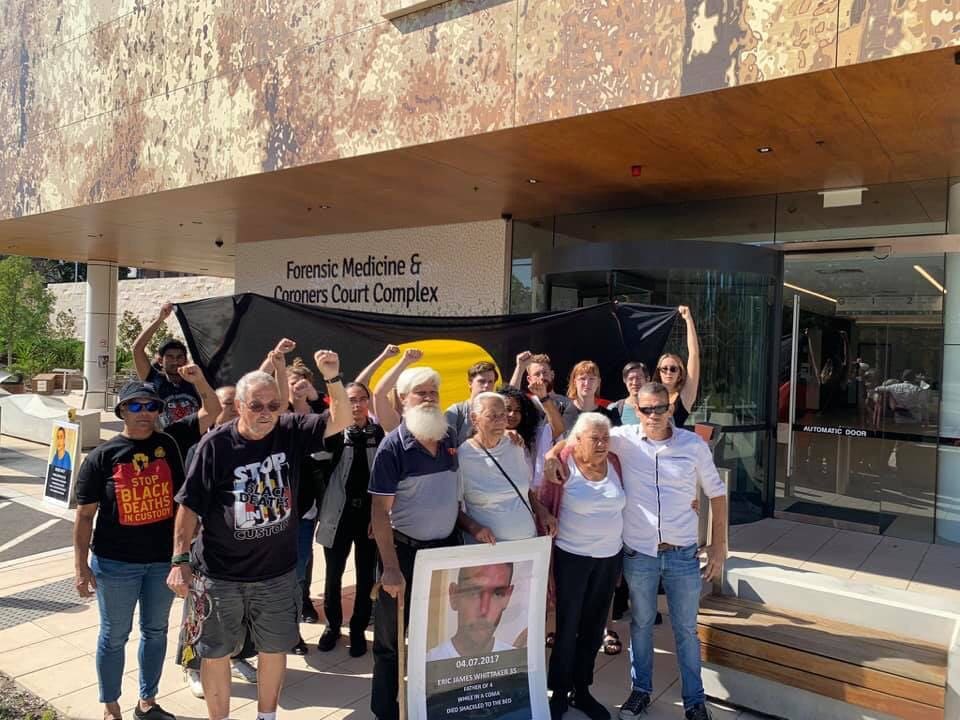This article discusses Aboriginal deaths in custody.
On Friday morning, a small contingent gathered at the NSW State Coroner’s Court to hear the final findings of a three-year long coronial inquest, demanding justice for the death of Eric Whittaker.
Eric Whittaker was a proud Kamilaroi man and a father of four children. Whittaker died in custody in Westmead Hospital on 4 July 2017, shackled to a bed despite being unresponsive and unconscious. The cause of Whittaker’s death was found to be a subarachnoid brain haemorrhage.
The final findings of the Court, delivered by State Coroner Magistrate O’Sullivan, noted that Whittaker made a total of 20 calls on the emergency intercom system between 4:00AM and 7:00AM from his cell in Parklea Correctional Centre, pleading for help. Yet, not a single welfare check was made, despite the fact that Whittaker had been heard shouting in a distressed tone, pleading for help and asking to be let out.
The Coroner acknowledged the failures of the correctional officers, noting that Whittaker’s inability to coherently describe a medical condition led to Correctional Officer James Dobry’s belief that Whittaker did not have any condition. Dobry was one of four correctional officers who were cited in the Coroner’s findings. It was found that it should have been reasonably known to the officers that Whittaker needed urgent medical attention. The Coroner acknowledged that a critical three hours was wasted by the officers’ negligence, saying that the officers “failed to recognise the signs of a medical emergency [which] resulted in a delay of care to Eric that is disgraceful… The vital hours to treat Eric’s condition were lost.”
Though the Coroner was unsure that earlier intervention could have spared his life, it was noted that Whittaker would have had a significantly higher chance of surviving. The GEO Group, who were responsible for the management of Parklea Correctional Centre during the time of Eric’s death, gave evidence that internal disciplinary action had already been taken against the officers responsible.
Another focus of the Coroner’s findings was the unjust shackling of Whittaker. Though restraints are intended to be a last resort measure, an unconscious Whittaker was shackled by hospital staff in the Intensive Care Unit. The Coroner found there was no justification to shackle a completely unconscious person to a hospital bed and this action was “disrespectful, degrading and unnecessary.” Some nominal administrative changes were made to lessen the use of restraints on inmates when admitted to hospital. Professor Holdgate, one of the medical experts that was called to examine the circumstances of Eric’s death, describes the photograph as “horrific.”
The coronial inquest of Eric Whittaker is one in a long and abhorrent history of systemic injustice for families affected by deaths in custody. Despite acknowledging that Indigenous deaths in custody “continue to be a national shame”, the Coroner went on to claim that improving this unjust system was “beyond the power of this court”, seemingly absolving the Court of responsibility to provide any justice for Whittaker’s family. The Coroner closed the hearing by echoing the Uluru Statement from the Heart:
“Proportionally, [Indigenous people] are the most incarcerated people on the planet. We are not an innately criminal people… Our youth languish in detention in obscene numbers. They should be our hope for the future.”
Disclaimer: Nina Dillon Britton was not involved in the editing or publication of this article.





